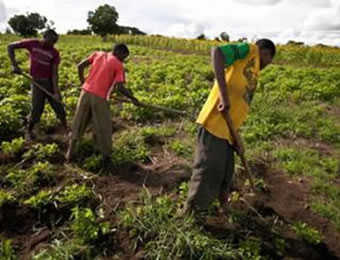Sub Saharan African farmers will soon have access to improved cowpea varieties that will lead to increase in yield with the development of Maruca Resistant Cowpeas through public-private partnership project that has identified elite events and speedily advancing towards de-regulation and commercial release to farmers.
Cowpea researchers involved in the development of Pod Borer-Resistant cowpea (beans) say it’s a game changer that would improve the livelihoods of at least 8 million African farmers.
These varieties are expected to reduce grain yield losses caused by the Pod borer, Maruca vitrata, as well as reduce the need for insecticidal sprays. The expected yield improvement will impact household, national and global food security and economic status.
Considered as the most important food grain legume in the dry savannas of tropical Africa where it is grown on more than 12.5 million hectares, Cowpea (Vigna unguiculata L. Walp) is rich in quality protein and its energy content almost equal to that of cereal grains.
The legume is a good source of quality fodder for livestock and provides cash income. Nearly 200 million people in Africa consume the crop.
However, many biotic and abiotic factors greatly reduce cowpea productivity in the traditional African farming systems. Among these constraints is the pod borer, Maruca vitrata, which perennially damages cowpea pods in the fields.
The pod borer (Maruca vitrata) is a major Lepidopteran pest that inflicts severe damage to the cowpea plant. In severe infestations yield losses of between 70–80 percent have been reported. Control through spraying with insecticide has not been widely adopted by farmers due its prohibitive costs. On the other hand, farmers who have adopted control through spraying have been exposed to serious health hazards.
According to Dr Dennis Kyetere, Executive Director with the African Agricultural Technology Foundation, during the annual review and work planning meeting held at IITA- Ibadan, Nigeria, the deployment of a cowpea product that is capable of protecting itself from attack by Maruca will make it easier and cheaper for farmers to produce cowpeas in areas where this pest is a problem,
His words: “I am particularly excited about the prospects that the project holds given the excellent results from the trial fields across the four countries involved in this research, Countries like Nigeria will stop importing cowpeas in the coming years as it is expected to be cowpea sufficient with the advent of this variety”.
The goal of the Pod-borer Resistant Cowpea Project is to develop and disseminate farmer-preferred and locally adapted Maruca-resistant cowpea varieties in Sub-Saharan Africa.
The Pod-borer Resistant Cowpea Project is a public private partnership coordinated by AATF




